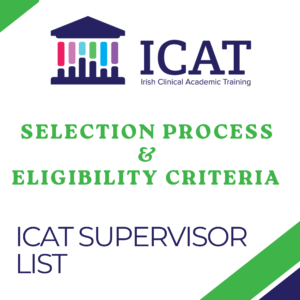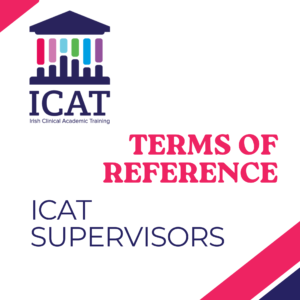Supervisor Database Search
Guidance for ICAT Supervisors
Supervisor Database
University College Dublin
Faculty of Paediatrics, School of Medicine
- infectious disease and the immune system
- epidemiology/population health research
- global health/inclusion health
- clinical trials
- Obstetrics and Gynaecology
- Paediatrics
- Public Health
University College Dublin
- physiology and non-communicable disease
- Medicine
Royal College of Surgeons in Ireland
Anatomy and Regenerative Medicine
- cell and developmental biology/regenerative medicine
- bioengineering/medical devices
- Medicine
- Surgery
- Pathology
University of Galway
School of Mathematical & Statistical Sciences / School of Physics
- genetics, genomics and molecular biology
- cancer/oncology
- artificial intelligence/machine learning/data analytics
- Other
radiomics
- Medicine
- Obstetrics and Gynaecology
- Paediatrics
- Pathology
- Radiology
University College Dublin
School of Medicine
- infectious disease and the immune system
- cell and developmental biology/regenerative medicine
- physiology and non-communicable disease
- Medicine
University of Galway
Pharmacology & Therapeutics
- infectious disease and the immune system
- cell and developmental biology/regenerative medicine
- cancer/oncology
- Medicine
University College Dublin
School of Veterinary Medicine
- infectious disease and the immune system
- cancer/oncology
- comparative medicine
- Other
Histology, pathology, post-mortem
- Veterinary Medicine
University College Dublin
- genetics, genomics and molecular biology
- one health
- Other
veterinary public health
- Medicine
- Public Health
- Veterinary Medicine
University of Galway
Pharmacology and Therapeutics
- genetics, genomics and molecular biology
- physiology and non-communicable disease
- neuroscience and mental health
- epidemiology/population health research
- artificial intelligence/machine learning/data analytics
- Other
Neurodegenerative disorders (Alzheimer's, Huntington's, Parkinson's disease and Multiple Sclerosis)
- Medicine
- Psychiatry
- Anaesthetics
- Ophthalmology
- Pathology
Trinity College Dublin
Pharmacy & Pharmaceutical Sciences
- neuroscience and mental health
- Medicine
- Psychiatry
- Pathology
Royal College of Surgeons in Ireland
Dept of Physiology and Medical Physics
- cancer/oncology
- Surgery
- Pathology
University College Dublin
Veterinary Biosciences
- physiology and non-communicable disease
- cancer/oncology
- bioengineering/medical devices
- comparative medicine
- Other
Network Pharmacology
- Medicine
- Veterinary Medicine
Queen's University Belfast
EEECS
- neuroscience and mental health
- clinical trials
- Other
Machine learning, artificial intellegence, data analytics
- Public Health
University College Dublin
Medicine
- cell and developmental biology/regenerative medicine
- physiology and non-communicable disease
- cancer/oncology
- global health/inclusion health
- clinical trials
- Medicine
- Pathology
University College Dublin
Computer Science
- artificial intelligence/machine learning/data analytics
- Radiology
Royal College of Surgeons in Ireland
Physiology and Medical Physics
- genetics, genomics and molecular biology
- cancer/oncology
- Medicine
- Surgery
- Paediatrics
Queen's University Belfast
Wellcome-Wolfson Institute for Experimental Medicine
- clinical trials
- Other
critical illness, acute respiratory failure, rehabilitation, methodology
- Medicine
- Public Health
- Sports and Exercise Medicine
Trinity College Dublin
School of Dental Science
- epidemiology/population health research
- global health/inclusion health
- preventive medicine/behavioural change interventions
- Anaesthetics
- Dentistry
Trinity College Dublin
Public Health & Primary Care
- epidemiology/population health research
- Other
Prevention of chronic disease; behavioural change interventions
- Public Health
Trinity College Dublin
Trinity College Institute of Neuroscience
- neuroscience and mental health
- Psychiatry
- Public Health
Trinity College Dublin
Clinical Medicine
- infectious disease and the immune system
- epidemiology/population health research
- Medicine
- Surgery
- Psychiatry
- Emergency Medicine
- General Practice
- Obstetrics and Gynaecology
- Paediatrics
- Public Health
University College Dublin
School of Veterinary Medicine
- one health
- Other
Veterinary diagnostic Imaging
- Radiology
- Veterinary Medicine
Queen's University Belfast
Patrick G Johnston Centre for Cancer Research
- genetics, genomics and molecular biology
- infectious disease and the immune system
- cell and developmental biology/regenerative medicine
- physiology and non-communicable disease
- cancer/oncology
- Medicine
- General Practice
- Pathology
Trinity College Dublin
Trinity College Institute of Neuroscience
- neuroscience and mental health
- Medicine
- Surgery
- Psychiatry
- Anaesthetics
- Emergency Medicine

